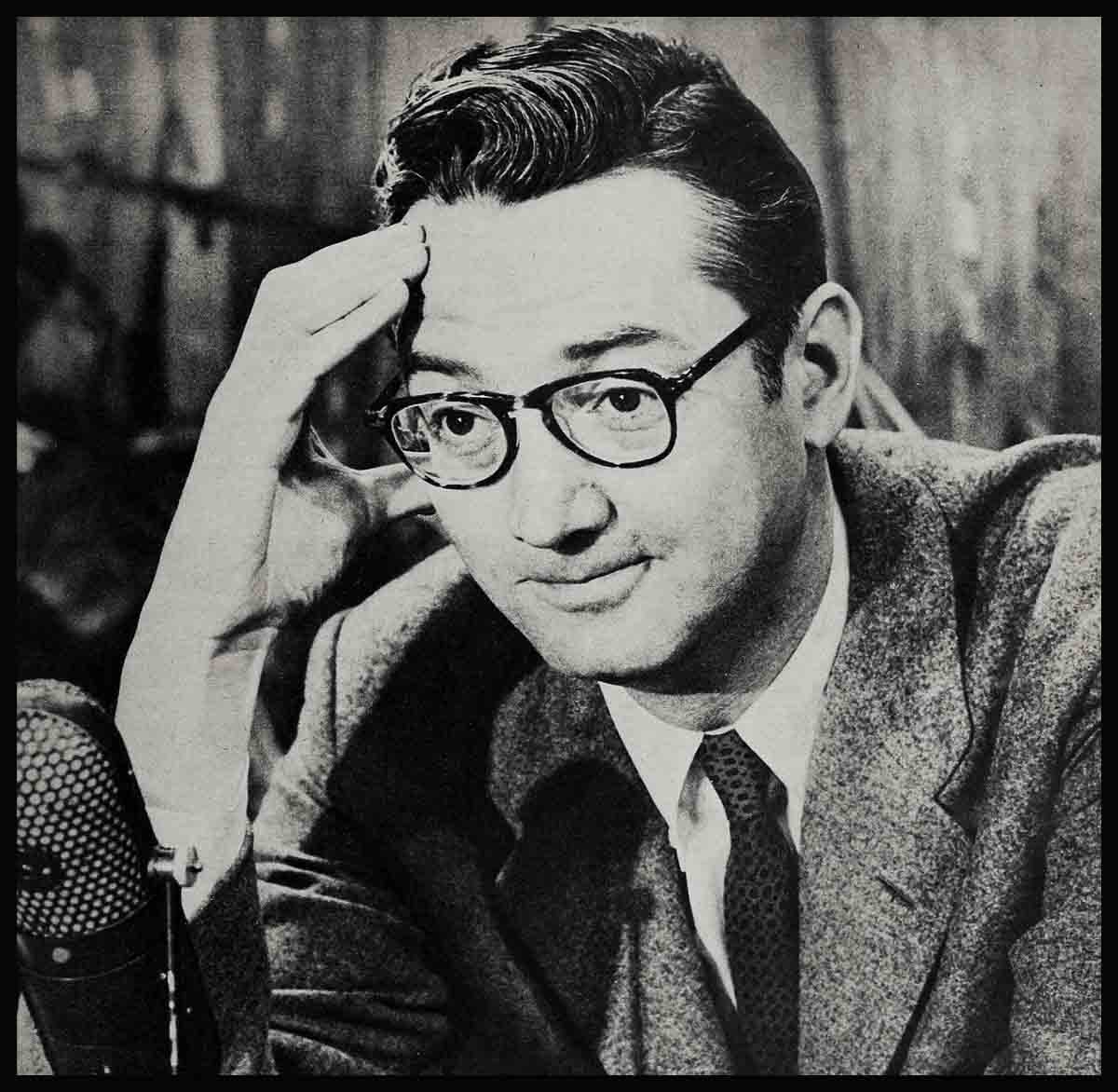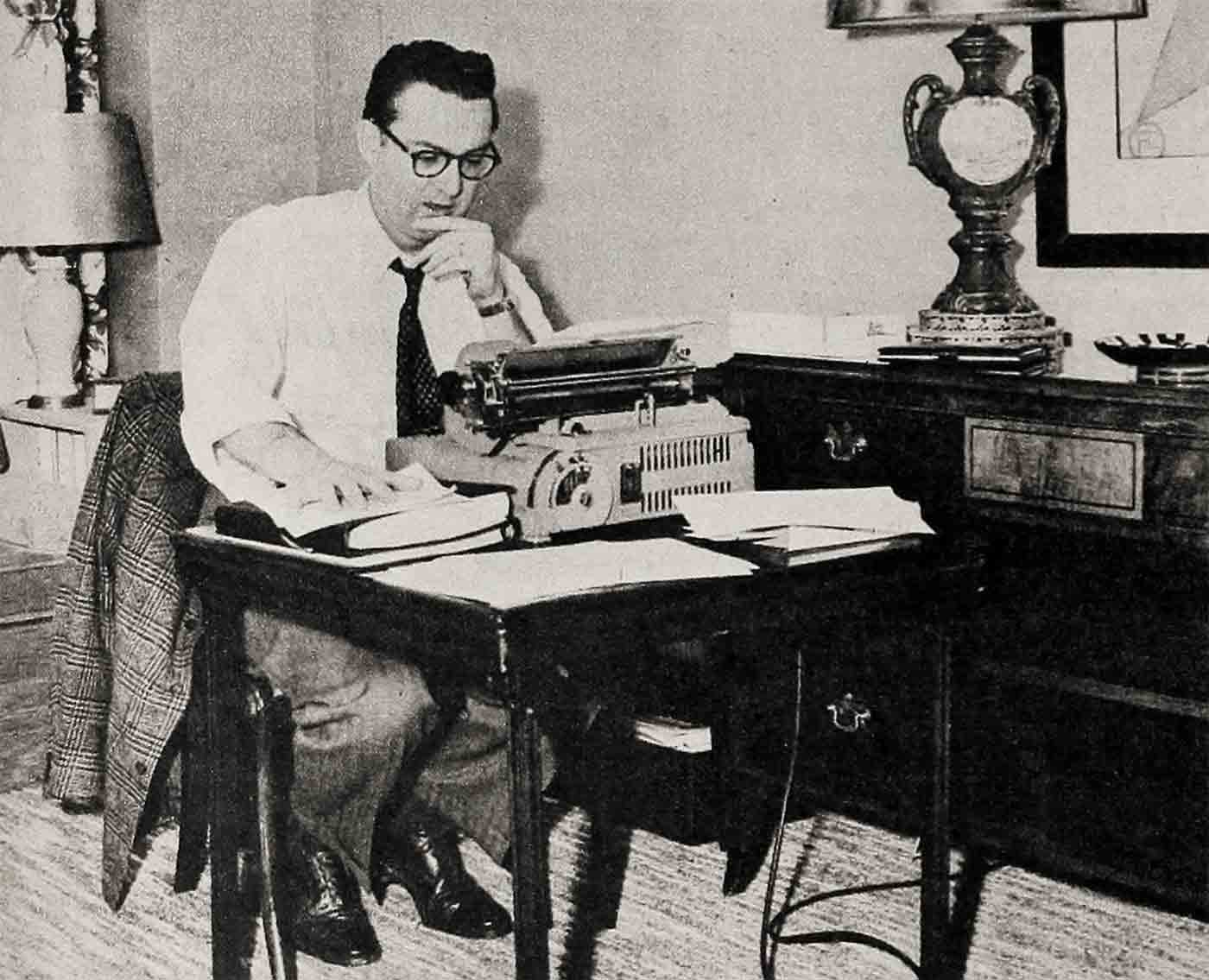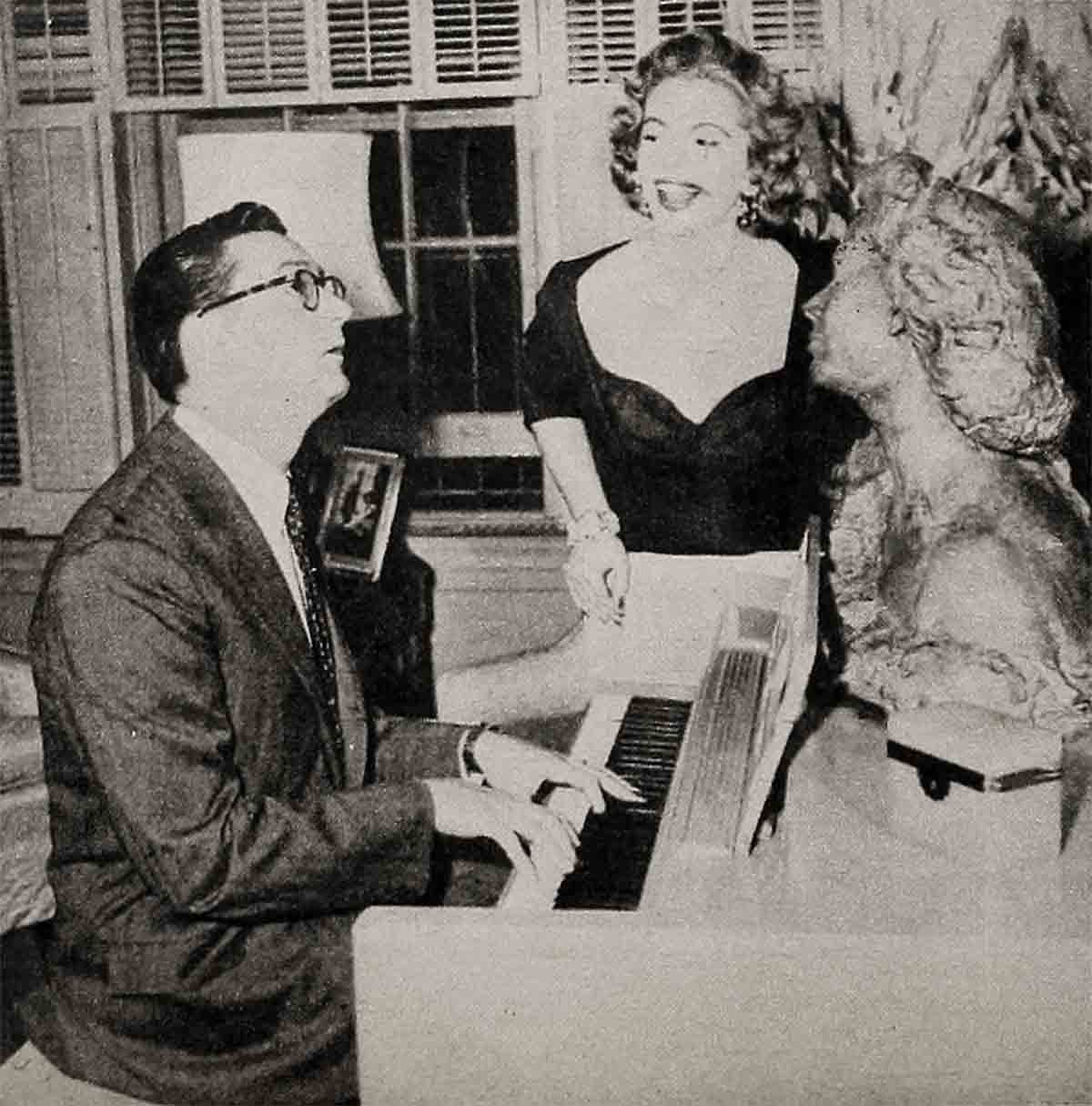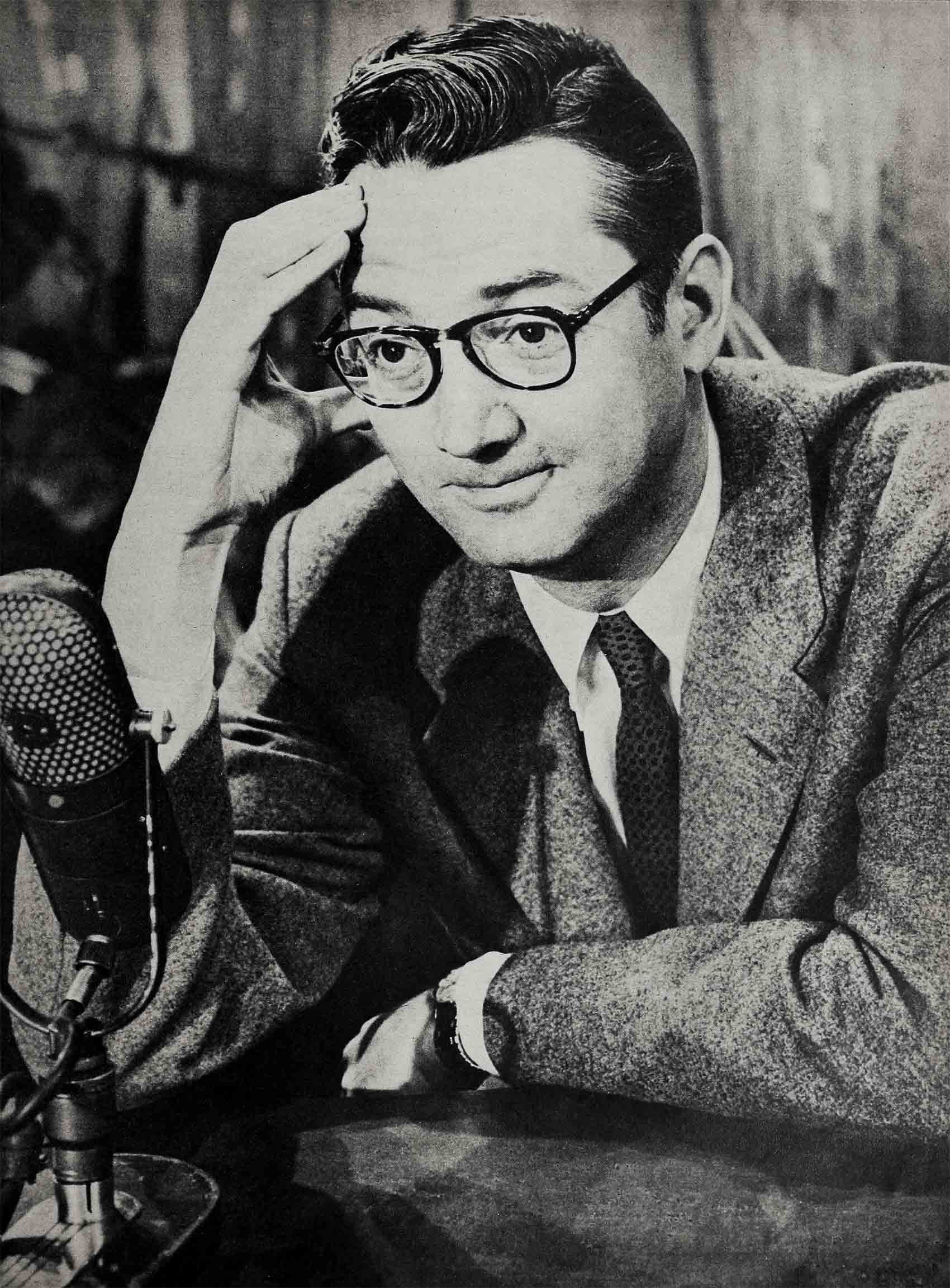
The Incredible Double Life Of Steve Allen
You would not recognize the Steve Allen you know from Tonight if you sat around and talked to him in person.
When you see Steve on his show, you see a genial fellow who plays a pretty mean piano; who sings, not quite like Bing, but nice and relaxed; who cracks jokes, some of them his own; who ad-libs with a flair; who mugs a little, and who may even shuffle off to Buffalo. Seemingly the easiest-going of guys, he does all sorts of crazy things on camera. He rolls up his trousers to prove he has knobby knees (he has); he swims; plays a little basketball; talks to a snake; feeds a porpoise; goes out on the street to sell newspapers or, dressed like a cop, stops the traffic in front of NBC’s Hudson Theatre. A spontaneous fellow, you’d say, with hardly any worries in the world. He’d be the life of any party.
Oh yeah?
Steve away from the cameras is an hombre of a different hue. He is quiet to the point of silence. Alone with you, he does not look you in the eye. He will answer questions, in his diffident way, but he hardly ever offers any information, seldom makes a sudden observation. What may sound spontaneous often turns out to be an Allen cliché that he has pulled many times. You soon find out that you have to handle all the small talk and most of the big talk too.
Entertaining in his own living room, he makes like a clam. He has been known to spend an entire evening sitting on the floor, his back to his company, watching television!
At first you think, “Maybe he has a hangover.” But no, because Steve doesn’t drink enough to call it drinking. Most people could take his monthly ration of grog at one sitting and not even think of hiccupping. He may quaff beer for commercials, but off screen he has trouble worrying down more than a half can of the foamy stuff. Sometimes he’ll toy with a little mild wine, just to be sociable, and this last year he’s developed a vague taste for one goblet of champagne with dinner. But most of the time he just sticks to tomato juice or fidgets with a water glass.
Then you think, “He’s just sleepy today.” It is true that Steve is the perfect “B” type: He doesn’t really start operating until dusk. He hates to get up in the morning, and therefore seldom does. If you meet him at 1 or 2 p.m., he’s still rubbing the sleep out of his eyes. (This is a big reason, incidentally, why his radio and TV successes have been midnight shows; he would be starving today if he’d been handed many early-bird assignments.) But no; even at 11 pm., after a good ten hours of sacktime the night before, the off-screen Steve has that same uncomfortable air.
Finally you decide, “He’s sick; he just doesn’t feel well today.” This, too, is not the cause. In the first place, he eats such plain foods that he couldn’t have anything wrong with his stomach. He doesn’t smoke at all, let alone too much. The asthma he suffered so cruelly from as a boy has practically disappeared. And, although he has a tendency to get a little big and soft, he lost weight on studio orders before he made The Benny Goodman Story and has not returned to his heavy scale-tipping.

Give him crowds
To understand Steve’s party-pooping, you have to realize that he does not like to see people alone or in small groups, and that he doesn’t do it if he can help it. When he has to meet people, he’s usually flanked by his press agent or his manager or his wife, Jayne Meadows. With her around, he doesn’t have to talk. No one has ever accused Jayne of not being able to handle a little chit chat; with her, it flows and flows and flows. You can almost hear Steve’s sigh of relief when she whips into view and takes the conversational load off his shoulders. He smiles, leans back, and leaves it to Jayne. Some people have left their Park Avenue apartment after spending an evening with the Allens and, when Jayne’s voice stops ringing in their ears, realize they can’t remember one statement from Steve except lines like a “Yes, dear,” and “The dinner was wonderful.”
“This is a comedian?” you ask yourself.
Yes, this is a comedian—merely not one that is “on” all the time. Before he can relax and wax witty, Steve Allen has one requirement: a great big audience down front. George Burns and Groucho and Phil Silvers take one look at a small group of people and immediately turn it into a bunch of grinning faces. Steve, finding himself in an intime set-up, either looks expectant, gazes off into the distance, or literally squirms. He readily admits that he doesn’t feel at ease until he stands on a stage and faces the amorphous mass of a studio audience. Not for him the Godfrey theory of TV performing—pretending you are talking to one or two people in a living room. The mere thought would send Steve scurrying backstage.
Why is Steve so ill at ease around a few people in the flesh? Because he has never completely recovered from his unhappy childhood. It made him the introvert he is.
Born in a trunk
Looking back on his early years, Steve says that sometimes, “I wanted to kill myself.”
Stephen Valentine Patrick William Allen was born in New York City on December 26, 1921. His father, William G. Allen, a singer and straight man known on vaudeville bills as Billy Allen, died when Steve was only eighteen months old. His mother, Belle Montrose, was bereft without her partner-husband, but continued with her career as a comedienne, taking little Steve with her from one backstage to another for five years. Being born in a trunk isn’t always the fun it’s cracked up to be: An only child, Steve may have enjoyed having Sandra Berle, Milton’s famous mother, as a sometime sitter; and even at that young age, he undoubtedly reveled in his mother’s affluent periods. But it was also a life that precluded any regular playmates and that included weeks of no bookings for Belle and dingy hotel rooms as a home for little Steve.

The money problem
Not the provident type, Steve’s mother never saved enough from her good weeks to tide her over the bad ones in any style. Now retired and living alone in California, Belle Montrose has to depend on her son for money. Steve visits her occasionally when he’s on the coast, but her mercurial disposition and non-abstemious inclinations don’t jibe with Steve’s personality. He loves her, but they can’t get along for any sustained period of time.
Steve’s childhood—riches one week and walk-up flats the next—was the cause of his becoming, as an adult, very security-conscious. He has no desire for great wealth, but he is determined never to be poor again. Thus, although he could live on a fairly grandiose scale on the net from his $350,000 per annum, he prefers saving and investing his money. In contrast to other TV couples, he and Jayne live a modest life. They have only one car and one full-time servant. Steve has relatively few clothes. Their Park Avenue apartment, while comfortable, is hardly extra-plush. When Steve’s three sons by his first marriage come to visit—on vacations and in the summer—all the boys have to pile into the one extra bedroom.
Life with the relatives eat
Steve’s mother’s relatives, the Donohues, didn’t exactly brighten up his boyhood either. When he was five and ready for kindergarten, his mother ceremoniously parked him with her two working sisters and her two bachelor brothers in Chicago. She couldn’t keep him with her any longer, and anyway—as she is the first to admit—Belle Montrose wasn’t good for her son. She had a knack of getting him into trouble. One day, when she took him out for a drive, they had an accident and Steve ended up in the hospital with a concussion. Another time, when she took him to her agent’s office with her, she saw a police dog in the. waiting room and told Steve to “Pat the nice doggie.” He dutifully did—and got his face thoroughly scratched in return. Everyone figured Steve would be safer at the Donohues’, and there his headquarters remained until he went off to college—except when his mother periodically retrieved him, or when she fought with her family and yanked him away, or when he was sent away to school, or when he ran away.
Steve was so miserable that, when he ran away, he did more than pack a knapsack and head for a neighbor’s house. He got on his bicycle and headed for Gary, Indiana, and then, switching to freight cars, made it as far away from Chicago as Houston, Texas. He went back “home” only because he was footsore, and hungry.
Steve hated it at the Donohues’—partly because they were so garrulous that he had little chance to get a word in edgewise or any other way. The Donohues liked to scrap and declaim and talk, talk, talk; Steve’s ears got so sore that he consciously refused to add to the Donohue din, thus picking up the habit of silence that has persisted over the years. They were also superstitious people who brooked no back talk from their logical little nephew. They insisted, for instance, that he would drown if he took a bath after dinner. Steve tried convincing them otherwise, but he soon discovered that there was no percentage in butting his ideas against four brick walls. He gave up and withdrew into himself.
His asthma, which plagued him as a boy, also made him quiet because it made him feel bad a lot of the time. (He is so improved now that he can even take a few dogs and some cigar smoke in the same room with him; these two allergies lasted for years after he left the Donohues.)
His relatives, never understanding, jeered at him and dubbed him “The Sphinx”—hardly a move to make him talkative.
Besides the Donohues, Steve had to contend with too many schools. He spent his first six study years in ten—count ’em, ten—different public and boarding schools. This, as any child of a peripatetic parent will tell you, is rough. Time after time, just as he’d grown a root or two and made a friend or three. Steve would be yanked up and out and on to another strange place. The same routine prevailed during his high school years: He went to six separate schools then.

The way out
There was a silver lining to the cloud of Steve’s childhood, however: He is convinced that it helped make him the comedian he is today. One of his most fondly held theories is that every good comedian had a tough time of it as a kid, usually financially and religiously. Having been a Catholic in Chicago may not qualify Steve as a full-fledged member of a minority group, but, if his theory holds water, he had enough early troubles to help him become a comic in later life.
Bottled-up but bright, Steve sought out lets for expression when he was still quite young. In his teens, as now, he tried performing; after all, show business was in his blood. He had taken piano lessons for three years when he was a child—the sum total of his formal musical training—so he started playing at local weddings and small social events while he was in high school. He spent some of his earnings sitting in night clubs and studying big-name bands on week ends; he inculcated himself with their styles so thoroughly that he can still sit down at the piano and imitate any one of them. To this day Steve’s not at home in anything but the key of G and he still can’t read music, but a parlay of persistence and a good ear has made him a pianist. He got good enough quick enough in high school to appear on The Morris B. Sachs Amateur Hour, a Chicago version of the old Major Bowes show; he didn’t win, but the experience helped him realize that, although he couldn’t face his aunts and uncles with equanimity, he could perform in front of large numbers of non-relatives.
Writer, composer, humorist
Steve also found self-expression in writing, and here, too, small successes came soon, Some of his adolescent poems were published in local papers and magazines, and one essay won a prize. He enjoyed writing so much that, when he entered Drake University in Des Moines, Iowa, as a freshman, he majored in journalism. To this day, scribbling is an important part of his life. Besides Fourteen For Tonight (a collection of short stories) and The Funny Men (his polite but perspicacious analyses of other comedians), Steve has written a jazz column for Down Beat, bop versions of fairy tales, an NBC spectacular, and is doing a new monthly piece-about-everything for Cosmopolitan. Up on a shelf in his front hall closet at home are other unpublished works—part of a Broadway musical, a tome on song-writing, a mountainous semi-autobiographical novel. Added to these are hundreds of songs, his most famous being “Let’s Go To Church On Sunday Morning,” “Cotton Candy,” “An Old Piano Plays The Blues,” and all the theme music on Tonight. When, three years ago, Steve got the lead in a Broadway play called The Pink Elephant, he proceeded to do a lot of writing on that too. First asking permission to “change a few lines,” he ended up almost completely rewriting his own part—a move that didn’t exactly endear him to some of the other cast members, who had to struggle along with the original author’s not-very-funny lines, but a move that did make Steve the hit of the show. The Pink Elephant was a flop; Steve was great.
Steve not only gets pleasure and profit from writing; when he vents his displeasure, he takes to the typewriter. Although he can talk in no uncertain terms to his TV staff when they goof or don’t come through with good ideas, he prefers posting sharp-toned notices on the bulletin board in his office above the Hudson Theater. When he’s involved in a feud with a columnist or another TV star, he does it via the U.S. mails. When Jack Paar, an alarmingly outspoken fellow, decided that someone on Steve’s show was lifting ideas from his afternoon program, Jack said so-.out loud. Steve, in denying it, wrote page after page to Jack and put a stamp on it.
Whether his writing’s for fun or for feuding, it’s a sure thing that Steve wouldn’t have such an output to his credit if he were more of an extrovert.
Marriage and radio
Steve didn’t decide to make his major career in radio rather than writing until he switched to Arizona State Teachers College in Phoenix, Arizona, for his sophomore year in 1942 (a move he made to relieve his asthma). One deciding factor was that there was more money in the airwaves: He got $45 a week for working parttime at KOY, a local radio station, doing the usual beginner’s chores of announcing, newscasting, acting, scripting, record-spinning, jingle-writing and sweeping up. He spent some of this largesse on dating a pretty little freshman named Dorothy Goodman. While he was doing a short hitch in the Army at a California camp (he was discharged because of his asthma), he sent for Dorothy and they were married. Returning to Phoenix with his eighteen-year-old bride, Steve started school again, but he had to quit and turn to KOY fulltime. A baby was on the way, and he needed more than $45. Ambition had set in, too, and Steve trained his sights on Los Angeles, where the networks had headquarters. Augmenting his income by piano-playing in nightclubs and steak houses, he managed to save $1000 and, in 1944, Steve, Dorothy, and Steve, Jr., headed for Hollywood.
Even with the wartime manpower shortage, he didn’t land a job until the Allen kitty was almost gone. Just before starvation set in, he landed an announcer’s job at Mutual, then got promoted to an early-morning disk jockey show. CBS gave him, his next boost up the ladder by making him a man-about-their-studio; he even covered wrestling matches for them, and in his spare time made a couple of bad movies that, to his relief, hardly anyone ever saw.
All this time Steve was learning, learning, learning. Most of his friends being musicians and songwriters, he picked up some minor musical talents that have stood him in good stead: He learned enough to fool around on a tuba, fingered the trumpet enough to get in some licks, and picked up the clarinet a few times. (Benny Goodman, of course, did the recording for the sound track of The Benny Goodman Story, but Steve, still learning, took clarinet lessons to get the fingering perfect.) When he got his big break—a late-night disk-jockey show—he was ready to toss out the records and provide some all-’round entertainment himself.
Divorce
Steve’s career was going great guns. By the summer of 750, he was raking in some $900 a week and got to summer-substitute for Eve Arden’s Our Miss Brooks on the network. But there was trouble at home. He loved his children—Steve, Jr., had been followed by Brian and David—but he and Dorothy had drifted apart. It was not a question of his “going Hollywood” at all; his house was small, his tastes were simple. And there wasn’t any other woman. But, as so often happens when two people have married very young and one of them goes on to make a splash, incompatibility sets in. Dorothy, busy with the three boys, didn’t have time to enter Steve’s social life, especially when he worked at night and had to socialize in the daytime. More and more, Steve found himself going without her, meeting people she never met. They were leading two lives and speaking two different languages, and soon their little foibles got on each other’s nerves.
Steve would look at Dorothy and, in his mind, compare her unfavorably with the girls he’d seen at a party. (He knew, of course, that those girls didn’t have three little hellions at home to take care of, but the knowledge didn’t help the comparison.) Their little house always seemed full of diapers and late dinners and broken toys (again understandable, but still annoying). Dorothy wanted more help from Steve around the place, but he was at just that point in his career when he needed to be out with musicians and agents and fellow performers.
With his home collapsing for the umpteenth time in his life, Steve was desperate. After all, he had been brought up not to believe in divorce, he loved the boys, and he felt guilty. During this black period, he would drive around by himself stewing about the situation, returning home swearing he would make everything all right, and then let some little thing make him blow his top. He even tried drinking; that, of course, didn’t help either. One night he consciously tried to get drunk to forget. He succeeded in getting drunk, but when he woke up with an A-No. 1 hangover, his unhappiness was still there along with a splitting head.
The only solution, as Steve and Dorothy saw it, was a divorce; and after Steve moved to New York, Dorothy got one. Steve today is still very sensitive about it, and about having remarried, three years later, outside his church. But both of them, happily remarried, have made excellent readjustments. Steve had the help of a psychiatrist, and of Jayne, who turned out to be a terrific stepmother. In fact, before Steve married her, he made sure that his boys knew her and liked her; Jayne entertained all three during their vacations when she and Steve were courting. When Dorothy was remarried, to a movie musician, Steve’s conscience was finally almost stilled.
A family affair
Jayne’s and Steve’s courtship was a real family affair. One time, when the boys were in the east, Steve took a house on the water out on Long Island for them, and Jayne spent most of her spare time traveling out there to swim and picnic with the small fry. When the boys were in the city and Steve was busy, Jayne would pick them up, take them to her and her sister Audrey Meadow’s apartment, and stuff them with cookies. One time a reporter, bent on getting an interview on Audrey, ended up writing a piece about Audrey’s sister Jayne and her three prospective stepsons.
At first glance, Jayne Meadows wins a prize as The Most Unlikely Wife for Steve Allen. He tries to appear as ordinary as possible; Jayne takes great pride in having been born in China (her father was a missionary), in having learned Chinese before she learned English, in designing some of her own distinctive clothes, in Being Different. She put shutters at the windows of their apartment in New York “Because people in New York have draperies; in Hollywood, where everyone has shutters, I’d have draperies.” Steve dresses conservatively; Jayne sports bright colors, spike heels, earrings that jangle to her shoulders, and very V-neck dresses.
But look at the Allens more closely, and you’ll see more basis for a good marriage. Jayne is a very talented homemaker. Many’s the night she hems up a skirt while she sits at home watching his show and waiting for him to come home. She can cook; she does make curtains; she whips up Christmas ornaments; she takes an intense interest in their apartment.
They can share their career troubles. Steve can help Jayne find that perfect play to reaffirm her status as an actress. Jayne can offer shrewd advice on Steve’s added assignment: how to beat Ed Sullivan from 8 to 9 on Sundays, where NBC is pitting Steve against the oldest established permanent variety show in TV. That will be the Battle of the Season and the Battle of the Sphinxes, and we’re taking no bets.
THE END
—BY ALICE HOFFMAN
It is a quote. MODERN SCREEN MAGAZINE SEPTEMBER 1956




